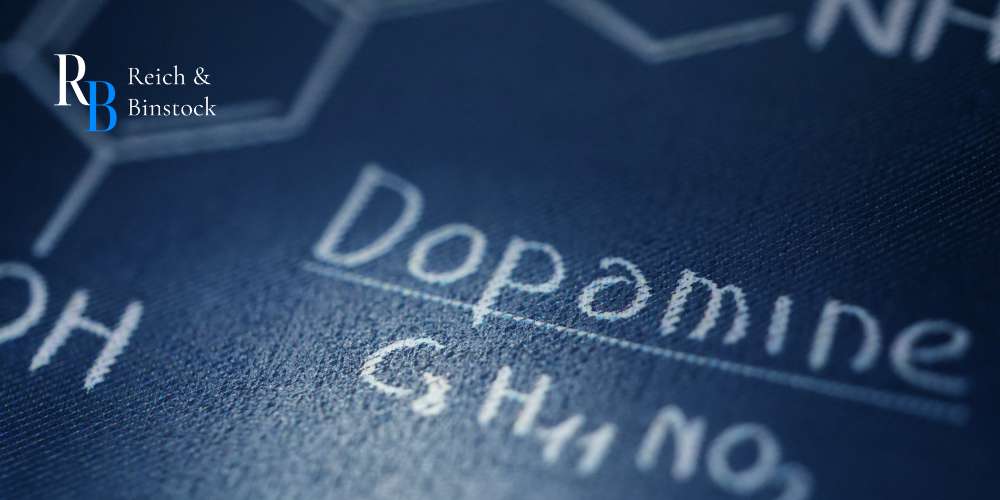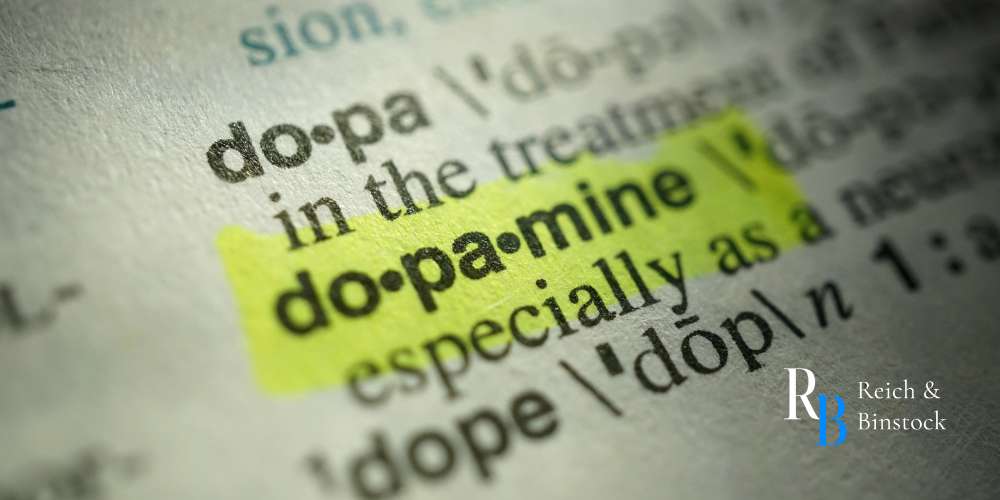Ever feel like you’re constantly glued to your phone, scrolling through social media feeds or checking notifications? This is often because of dopamine, a brain chemical that reinforces certain enjoyable behaviors. Unfortunately, this often leads people to develop unhealthy habits and even addictions, including addictions to social media.
But what if there was a way to reset your brain and replace your scrolling with other healthy activities? Luckily, there is. Many people who catch themselves constantly checking their socials or feeling anxious when they’re away from their devices engage in a dopamine detox, which helps reset the brain’s reward system.
If you have an unhealthy relationship with social media, contact the Texas social media addiction lawyer team at Reich & Binstock. Our team is dedicated to helping victims of social media addiction seek compensation for their losses, ensuring social media companies are held responsible for their addictive platforms.
Want to learn more? Call (713) 622-7271 to schedule a free initial consultation with an attorney on our team regarding your case.
What Is Dopamine?
Dopamine is a neurotransmitter in the brain that regulates a person’s mood and motivations. Neurotransmitters are chemicals that are released in the brain, and are designed to transmit certain signals between the neurons in the brain and the rest of the nervous system.
What Does Dopamine Do?
Dopamine plays a crucial role in what we’re motivated to do every day. When we engage in activities that are beneficial for survival, such as eating and socializing, dopamine creates feelings of pleasure and satisfaction, reinforcing these behaviors to ensure we engage in them in the future.
Just enough dopamine can help reinforce healthy behaviors and ensure we engage in them in the future. Too much dopamine, however, can force us to relentlessly chase the feel-good chemicals we received when we first engaged in a certain activity, regardless of whether or not it was healthy to engage in.
What Triggers Dopamine Release?
Various kinds of stimuli can trigger a dopamine response, but it’s most commonly released after activities that our brain finds pleasurable, rewarding, or novel. This can include eating delicious food, engaging in social interactions, receiving positive feedback, accomplishing goals, and even anticipating enjoyable experiences.
How Do Different Amounts of Dopamine Affect the Brain?

Different amounts of dopamine can have significant effects on the brain and behavior. Adequate dopamine levels contribute to feelings of pleasure, motivation, and reward, promoting a sense of well-being and satisfaction. This can enhance mood, motivation, and cognitive function, supporting mental health resilience. Imbalanced dopamine levels, however, can lead to various mental health issues.
Mental Health Effects of Dopamine
Low levels of dopamine may lead to symptoms such as lack of motivation, reduced interest in activities (anhedonia), mood swings, and difficulty concentrating. Conditions like Parkinson’s disease and ADHD are often associated with a dopamine deficiency in the brain, which can result in various mental and physical symptoms.
Conversely, high levels of dopamine can also impact the brain and behavior. Excessive amounts of dopamine are linked to conditions like schizophrenia, where individuals may experience hallucinations, delusions, and disorganized thinking.
Additionally, certain substances or behaviors can cause a spike in dopamine levels, which can lead to addictive behaviors like compulsions and cravings. The intense rush of dopamine can force the brain into an endless cycle of seeking out that stimulus for more dopamine, even if the stimulus results in negative consequences.
What Is Dopamine Addiction?
Dopamine addiction, also known as behavioral addiction or process addiction, refers to a pattern of compulsive behavior driven by the need for more dopamine. When we repeatedly engage in activities that provide us with an intense rush of dopamine, the dopamine pathways in our brains can rewrite themselves.
This can force us to unconsciously seek dopamine through the same activities over and over again, chasing the intense amount of dopamine released the first time we engaged in the activity. Unfortunately, this is difficult–and often impossible–to do, and can lead us to develop negative habits, if the original dopamine rush came from engaging with unhealthy stimuli.
What Dopamine Boosters Can Lead to Addiction?
There are a number of different unhealthy, but pleasurable activities that can cause dopamine to be released in the brain, often leading to addiction. Below are some of the most unhealthy dopamine-boosting activities that can hijack your brain’s reward system.
Alcohol, Caffeine, and Sugar
Alcohol, caffeine, and sugar are common substances that can temporarily boost dopamine levels in the brain, contributing to feelings of pleasure and reward. While moderate consumption of these substances may not necessarily lead to addiction, excessive or frequent use can desensitize dopamine receptors over time, leading to tolerance and dependence.
Social Media and Video Games

Engaging with others on social media and playing video games can stimulate dopamine release due to the interactive and rewarding nature of these activities. Likes, comments, and notifications on social media platforms, as well as achievements and rewards in video games, can trigger dopamine spikes. However, excessive use of social media and video games can lead to compulsive behaviors, where individuals feel a constant need to check their accounts or play games to maintain the dopamine-driven sense of reward.
Substance Use
Using recreational drugs like cocaine, heroin, and methamphetamine can lead to an intense rush of dopamine, resulting in intense euphoria and pleasure. These drugs hijack the brain’s natural reward system, causing a rapid release of dopamine that reinforces drug-seeking behavior. With repeated drug use, a tolerance can develop, requiring higher doses to achieve the same effects.
What Is a Dopamine Detox?
A dopamine detox, also known as a dopamine cleanse, is a practice aimed at reducing exposure to activities and substances that trigger dopamine release in the brain. This is often being used by those who have an addiction to social media platforms like Twitter, Instagram, Facebook, Snapchat, and YouTube.
The goal is to reset the brain’s reward system and reduce dependence on external stimuli for pleasure and motivation. During a dopamine detox, individuals typically abstain from unhealthy activities, like scrolling through social media, that have caused them to engage in certain addictive behaviors. Instead, they focus on healthy activities that promote relaxation, reflection, and connection with oneself and others.
By temporarily removing sources of excessive dopamine stimulation, the detox can help reset the brain’s dopamine pathways, breaking free of those reinforced habits. This can also help them experience increased mindfulness, improved mood regulation, and enhanced focus and productivity.
Dopamine Detox vs Dopamine Fasting
A dopamine fast is another name for a dopamine detox. Both dopamine detoxes and dopamine fasts require someone to abstain from certain unhealthy activities that release dopamine in the brain, resulting in maladaptive behaviors.
How to Do a Dopamine Detox

A dopamine detox can help reset a person’s dopamine levels by removing the harmful stimuli that are causing them to develop unhealthy habits. This is most often used with those looking to reduce their social media use and kick the addictive behaviors they’ve developed as a result of social media.
In order to do a dopamine detox, you’ll need to develop a set of rules for yourself that ensure you achieve the desired outcome. You may also need to ask friends and family for help, ensuring you have people to keep you accountable for your actions. Additionally, you’ll likely need various healthy habits to replace your unhealthy habits with, ensuring you have something productive or beneficial to do in your newfound time.
How to Reset Dopamine Levels
In order to properly reset your dopamine levels, you’ll need to fully remove yourself from the harmful behavior that’s providing you with dopamine. However, it can be difficult to quit anything “cold turkey,” so consider incrementally decreasing the amount of time you spend engaging in the harmful activity.
Additionally, it may be helpful to replace your time on social media with other, healthier activities, like taking a walk, engaging in creative hobbies, or meditating, which can help rebalance the brain’s dopamine levels. Since dopamine is a chemical released in the brain, it may also help to take care of your mind by prioritizing things like adequate sleep, nutrition, and stress management practices that support overall brain health.
Dopamine Detox Rules
The most important part of any kind of dopamine detox is the list of rules you set for yourself. It’s important that your rules are aligned with your overall goals, but are also achievable so that you don’t set yourself up for failure. If you’re looking to reduce your overall social media use, set rules for yourself that prevent you from accessing social media in the mornings or rules that prevent you from spending more than an hour on social media every day.
Dopamine Withdrawal Symptoms

Unfortunately, limiting the amount of time you spend engaging in addictive activities can cause you to experience dopamine withdrawal. The symptoms of dopamine withdrawal can vary, but the most common symptoms include:
- Mood swings
- Fatigue
- Cravings
- Difficulty concentrating
- Sleep disturbances
- Anhedonia (lack of interest in things that once brought you joy)
- Increased stress or anxiety
If you have difficulty coping with these symptoms when on a dopamine detox, you should speak with a healthcare or mental health professional.
Dopamine Detox Benefits
A dopamine detox can offer a wide range of benefits for a person’s physical, emotional, and mental health, including:
- Reduced stress and anxiety levels
- Improved focus and concentration
- Increased mindfulness
- Greater sense of fulfillment in healthy activities
- Increased energy levels
- Reduced negative feelings toward oneself
- Decreased compulsive and impulsive behaviors
How Long Does a Dopamine Detox Take?
This can depend on the unique circumstances of your addiction, including your age, the nature of your addiction, how long you have been addicted to it, and how often you engage in the unhealthy behavior you’re looking to kick.
In general, you may want to engage in a dopamine detox for at least 90 days, if you can. This will help ensure that your brain can provide you with a more healthy dopamine response when you engage in certain activities.
Can Someone Who Is Addicted to Dopamine File a Social Media Lawsuit?

Yes, if you recognize that you need a dopamine detox to help kick your social media addiction, you may be eligible to file a social media lawsuit against the social media company or companies responsible for your addiction. You may be eligible to file a social media lawsuit if:
- You or your child has a social media addiction
- The addiction has negatively affected you or your child’s mental or physical health
- The addiction began before you or your child turned 25 years old
Companies are responsible for making products that are safe to consume, so when those products cause consumers to suffer harm, they can be held financially responsible for their negligence in a product liability lawsuit.
If you can directly link your negative mental or physical health outcomes to a social media platform, you may be able to sue that platform’s company for losses like therapy expenses, mental anguish, and more.
Houston Social Media Addiction Claims Assistance
If you or a loved one is struggling with social media addiction, so much so that you’re in need of a total dopamine detox to fix the problem, you may be eligible for a social media addiction claim. At Reich & Binstock, our attorneys take social media addiction seriously, and understand the profound negative effects that social media platforms can have on people’s lives.
We’re dedicated to helping victims of social media addiction seek justice for their losses, and can help ensure your voice is heard, even when facing up against a massive media corporation. We’ll help gather evidence, speak with experts, and develop a case that’ll provide you with the best chance of receiving a favorable outcome in your case.
Call our law firm at (713) 622-7271 or contact us online to schedule a free consultation with us regarding your case.














